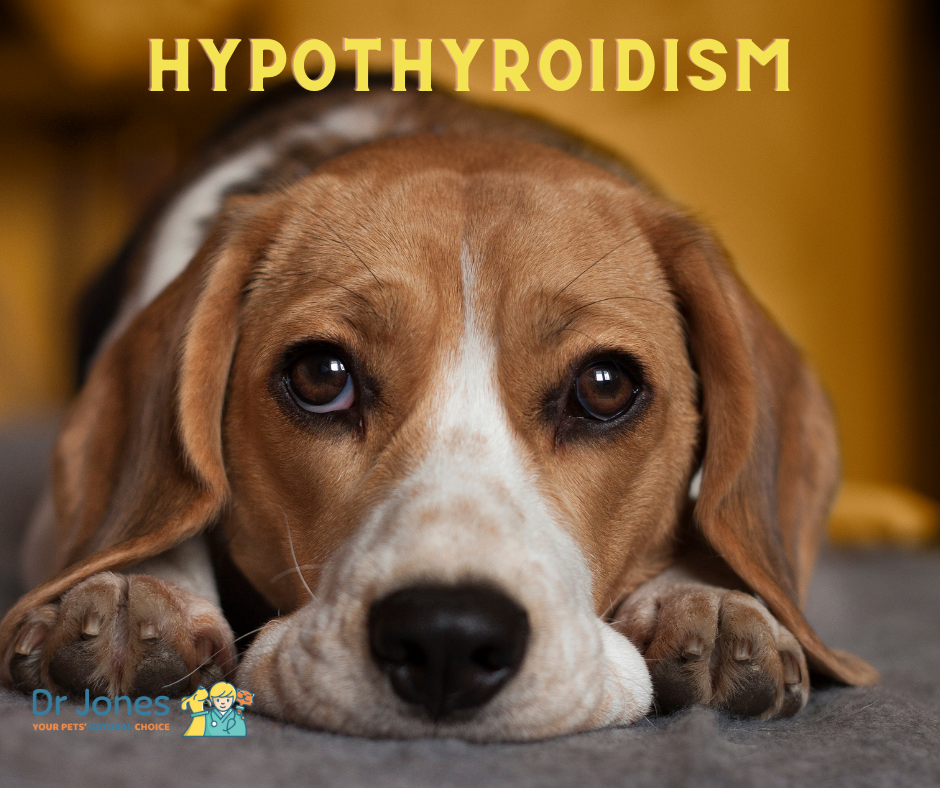Hypothyroidism

Welcome to part one of a two part series I’ll be exploring in thyroid health. This week, I’ll be talking about Hypothyroidism, and next week I’ll cover Hyperthyroidism, so be sure to check back in next week.
Hypothyroidism occurs when the thyroid gland becomes underactive, which ultimately slows the metabolism.
Signs
This is the most common hormone imbalance of dogs. Signs relating to low thyroid hormone in dogs are varied, but can include:
- Weight gain without an increase in appetite
- Lethargy and lack of desire to exercise
- Cold intolerance (gets cold easily)
- Elevated blood cholesterol
- Anemia
As well as skin problems such as:
- Dry, dull coat
- Excessive shedding and flaking
- Very thin to nearly bald coat
- Increased dark pigmentation in the skin
- Increased susceptibility and occurrence of skin and ear infections
- Failure to re-grow hair after clipping or shaving
Causes & Breeds
The condition is due to inadequate production of thyroid hormone (T4), produced from your dog’s thyroid gland. In most dogs the cause is auto-immune, meaning your dog’s immune system attacks the thyroid gland, causing inadequate production of thyroid hormone. This condition occurs mostly in middle age dogs.
Common breeds who are diagnosed with hypothyroidism are:
- Golden Retrievers
- Doberman Pinschers
- Irish Setters
- Dachshunds
- Boxers
- Great Danes
Solutions
PROPER DIAGNOSIS:
First ensure a proper diagnosis. This is one of the most over-diagnosed diseases in Veterinary medicine. If your pet is sick while being screened for thyroid disease, her thyroid levels will test low, even though she may be normal.
If your pet is on any type of steroid, even topical ear medication, this can lower the blood thyroid levels making her appear to be hypothyroid.
I advise screening for low thyroid only if your dog has the common clinical signs (such as skin changes, lethargy, weight gain). Talk to your veterinarian about all appropriate tests before treating.
EFA HELP:
Omega 3 Fatty Acids may be effective in decreasing the immune destruction of the thyroid gland. Provide a dose of 1000 mg per 10 lbs of body weight daily. My Krill oil is a great option to add Omega -3’s into your dog’s regimen (see link below).
AUTOIMMUNE DISEASE PROTECTION:
Most cases of hypothyroid disease are believed to be secondary to the immune system attacking the thyroid gland (auto-immune thyroiditis).
There are a number of supplements which can be helpful in normalizing the immune system, but there are particular ones that may be beneficial for the thyroid gland. Those are flavonoids, compounds in a class of their own. They compose the thousands of structures that give the bright color to fruits and vegetables. These include flavones, (apigenin), isoflavones (genistein), and flavanols (quercetin). Purchase a mixed bioflavonoid product that contains polyphenols, particularly EGCG (epigallocatechin-gallate), which is the specific flavonoid isolated from green tea. The dose for a 10 lb dog is 250 mg daily.
PROBIOTICS:
There are helpful bacteria which may slow the inflammatory response in the autoimmune diseases. Get a good quality probiotic, such as Lactobacillus Acidophilus and Bifidobacterium, and feed a high dose: 1 capsule per 40 lbs daily.
THYROID HORMONE SUPPLEMENTATION:
Unfortunately there aren’t very many things that you can do at home for your hypothyroid dog. The treatment with thyroid hormone pill supplementation is very safe and effective. The medication must be given daily and given for life.
KELP:
This is a great source of iodine. It is often used in conjunction with thyroid tablets to boost thyroid hormone levels. The dose of the dried herb is 1/4 teaspoon per 10 lbs of body weight.
ANTIOXIDANTS:
In hypothyroidism, the thyroid gland is being attacked by the immune system; therefore, antioxidants may give it some protection. The three most effective antioxidants are Vitamin E, Vitamin C and Selenium.
These are best given in combination: give 100 IU of Vitamin E, 100 mg of Vitamin C, and 20 ug of Selenium per 10 lbs of body weight daily.
Please let me know in the comments below if this was helpful, and you have any questions. Don’t forget to check back next week for part 2 on Hyperthyroidism.
My Omega – 3 Fatty Acid Krill Oil Supplement: